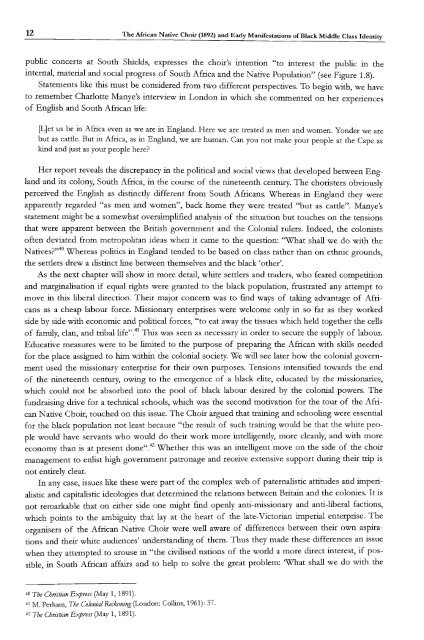South African Choral Music (Amakwaya): Song, Contest and the ...
South African Choral Music (Amakwaya): Song, Contest and the ...
South African Choral Music (Amakwaya): Song, Contest and the ...
You also want an ePaper? Increase the reach of your titles
YUMPU automatically turns print PDFs into web optimized ePapers that Google loves.
12 The Mrican Native Choir (1892) <strong>and</strong> Early Manifestations ofBlack Middle Class Identity<br />
public concerts at <strong>South</strong> Shields, expresses <strong>the</strong> choir's intention "to interest <strong>the</strong> public in <strong>the</strong><br />
internal, material <strong>and</strong> social progress of <strong>South</strong> Africa <strong>and</strong> <strong>the</strong> Native Population" (see Figure 1.8).<br />
Statements like this must be considered from two different perspectives. To begin with, we have<br />
to remember Charlotte Manye's interview in London in which she commented on her experiences<br />
of English <strong>and</strong> <strong>South</strong> <strong>African</strong> life:<br />
[L]et us be in Africa even as we are in Engl<strong>and</strong>. Here we are treated as men <strong>and</strong> women. Yonder we are<br />
but as cattle. But in Africa, as in Engl<strong>and</strong>, we are human. Can you not make your people at <strong>the</strong> Cape as<br />
kind <strong>and</strong> just as your people here?<br />
Her report reveals <strong>the</strong> discrepancy in <strong>the</strong> political <strong>and</strong> social views that developed between Engl<strong>and</strong><br />
<strong>and</strong> its colony, <strong>South</strong> Africa, in <strong>the</strong> course of <strong>the</strong> nineteenth century. The choristers obviously<br />
perceived <strong>the</strong> English as distinctly different from <strong>South</strong> <strong>African</strong>s. Whereas in Engl<strong>and</strong> <strong>the</strong>y were<br />
apparently regarded "as men <strong>and</strong> women", back home <strong>the</strong>y were treated "but as cattle". Manye's<br />
statement might be a somewhat oversimplified analysis of <strong>the</strong> situation but touches on <strong>the</strong> tensions<br />
that were apparent between <strong>the</strong> British government <strong>and</strong> <strong>the</strong> Colonial rulers. Indeed, <strong>the</strong> colonists<br />
often deviated from metropolitan ideas when it came to <strong>the</strong> question: ''What shall we do with <strong>the</strong><br />
Natives?,,40 Whereas politics in Engl<strong>and</strong> tended to be based on class ra<strong>the</strong>r than on ethnic grounds,<br />
<strong>the</strong> settlers drew a distinct line between <strong>the</strong>mselves <strong>and</strong> <strong>the</strong> black 'o<strong>the</strong>r'.<br />
As <strong>the</strong> next chapter will show in more detail, white settlers <strong>and</strong> traders, who feared competition<br />
<strong>and</strong> marginalisation if equal rights were granted to <strong>the</strong> black population, frustrated any attempt to<br />
move in this liberal direction. Their major concern was to find ways of taking advantage of <strong>African</strong>s<br />
as a cheap labour force. Missionary enterprises were welcome only in so far as <strong>the</strong>y worked<br />
side by side with economic <strong>and</strong> political forces, "to eat away <strong>the</strong> tissues which held toge<strong>the</strong>r <strong>the</strong> cells<br />
of family, clan, <strong>and</strong> triballife".41 This was seen as necessary in order to secure <strong>the</strong> supply of labour.<br />
Educative measures were to be limited to <strong>the</strong> purpose of preparing <strong>the</strong> <strong>African</strong> with skills needed<br />
for <strong>the</strong> place assigned to him within <strong>the</strong> colonial society. We will see later how <strong>the</strong> colonial government<br />
used <strong>the</strong> missionary enterprise for <strong>the</strong>ir own purposes. Tensions intensified towards <strong>the</strong> end<br />
of <strong>the</strong> nineteenth century, owing to <strong>the</strong> emergence of a black elite, educated by <strong>the</strong> missionaries,<br />
which could not be absorbed into <strong>the</strong> pool of black labour desired by <strong>the</strong> colonial powers. The<br />
fundraising drive for a technical schools, which was <strong>the</strong> second motivation for <strong>the</strong> tour of <strong>the</strong> <strong>African</strong><br />
Native Choir, touched on this issue. The Choir argued that training <strong>and</strong> schooling were essential<br />
for <strong>the</strong> black population not least because "<strong>the</strong> result of such training would be that <strong>the</strong> white people<br />
would have servants who would do <strong>the</strong>ir work more intelligently, more cleanly, <strong>and</strong> with more<br />
economy than is at present done".42 Whe<strong>the</strong>r this was an intelligent move on <strong>the</strong> side of <strong>the</strong> choir<br />
management to enlist high government patronage <strong>and</strong> receive extensive support during <strong>the</strong>ir trip is<br />
not entirely clear.<br />
In any case, issues like <strong>the</strong>se were part of <strong>the</strong> complex web of paternalistic attitudes <strong>and</strong> imperialistic<br />
<strong>and</strong> capitalistic ideologies that determined <strong>the</strong> relations between Britain <strong>and</strong> <strong>the</strong> colonies. It is<br />
not remarkable that on ei<strong>the</strong>r side one might find openly anti-missionary <strong>and</strong> anti-liberal factions,<br />
which points to <strong>the</strong> ambiguity that lay at <strong>the</strong> heart of <strong>the</strong> late-Victorian imperial enterprise. The<br />
organisers of <strong>the</strong> <strong>African</strong> Native Choir were well aware of differences between <strong>the</strong>ir own aspirations<br />
<strong>and</strong> <strong>the</strong>ir white audiences' underst<strong>and</strong>ing of <strong>the</strong>m. Thus <strong>the</strong>y made <strong>the</strong>se differences an issue<br />
when <strong>the</strong>y attempted to arouse in "<strong>the</strong> civilised nations of <strong>the</strong> world a more direct interest, if possible,<br />
in <strong>South</strong> <strong>African</strong> affairs <strong>and</strong> to help to solve <strong>the</strong> great problem: 'What shall we do with <strong>the</strong><br />
40 The Christian Express (May 1, 1891).<br />
41 M. Perham, The Colonial Reckoning (London: Collins, 1961): 37.<br />
42 The Christian Express (May 1, 1891).

















